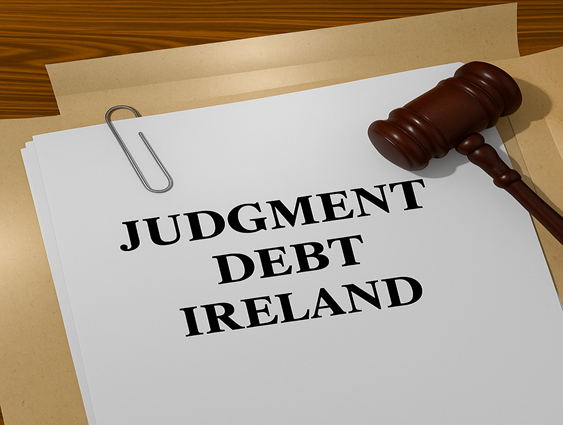If a creditor has obtained a court judgment against you for an unpaid debt, it is important to understand the consequences and your legal rights. A court judgment is a formal declaration by a judge that a debt is legally owed. Once granted, it gives the creditor several legal tools to recover the money.
This article outlines what can happen after a judgment is issued, how long it remains enforceable, and the lawful ways to deal with it.
How Long Is a Judgment Enforceable?
In Ireland, a judgment debt can be enforced for up to 12 years. This means that even if the creditor takes no immediate action, they may return years later and begin enforcement proceedings. Interest may also accrue on the judgment, depending on the terms of the court order, and legal costs can be added to the total amount owed.
- Publication of the Judgment
Once a judgment is granted, it may be published in Stubbs Gazette or another credit reference publication. This makes the debt publicly visible and may affect your credit rating, limiting your ability to access loans or other financial products.
- Enforcement by the Sheriff
A creditor can send the judgment to the Sheriff. The Sheriff is authorised to seize personal or business assets belonging to the debtor in order to recover the value of the debt. This is often one of the first enforcement steps taken.
- Court Summons and Instalment Orders
If the debt remains unpaid, the debtor may be summoned to court for an assessment of means. This allows a judge to issue an Instalment Order, such as requiring payment of €200 per month.
If the debtor does not comply, the court may issue a Summons for Attachment and Committal. This can lead to arrest and imprisonment for failing to obey a court order, but not for the debt itself.
- Judgment Mortgage
If the debtor owns property, the creditor can register a judgment mortgage against it. This effectively secures the debt against the property, much like a bank mortgage. The debt must be paid if the property is sold or refinanced, and interest may continue to accrue. Even if the property is not sold, the judgment mortgage can remain in place for years.
- Bankruptcy
As a last resort, either the creditor or the debtor can initiate bankruptcy proceedings. This involves liquidating the debtor’s assets to repay creditors and has serious long-term financial and legal implications.
How Can a Debtor Legally Eliminate a Judgment Debt in Ireland?
There are three lawful ways to clear judgment debt in Ireland:
- Informal Settlement
A debtor may negotiate a reduced or structured settlement directly with the creditor. However, legal advice should be sought before doing so. Acknowledging the debt, even unintentionally, may reset time limits under the Statute of Limitations.
- Formal Insolvency Solutions
A Personal Insolvency Practitioner (PIP) can help structure a formal debt resolution. There are two main options:
- Debt Settlement Arrangement (DSA): Used for unsecured debts when no property is involved.
- Personal Insolvency Arrangement (PIA): Suitable when the debtor has both secured and unsecured debts, such as a mortgage.
These must be approved by creditors and the court.
- Bankruptcy
If no other option is appropriate, bankruptcy may be the only solution. It clears debts but also involves restrictions on assets, income, and future borrowing.
Get Legal Advice Early
Dealing with court judgments and debt enforcement can be complex and overwhelming, especially when you’re unsure of your rights or options. The earlier you seek legal advice, the more tools may be available to help you protect your income, assets, and financial future.
Our solicitors specialise in helping individuals manage and resolve debt judgments. Whether you’re facing enforcement action, considering a settlement, or exploring insolvency options, we are here to guide you with clarity and discretion.
Contact us today at Anthony Joyce & Co solicitors for a free confidential consultation with an experienced solicitor.




